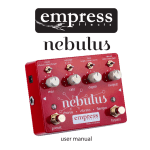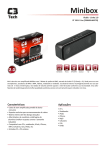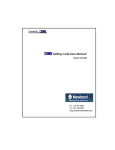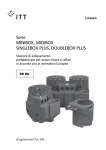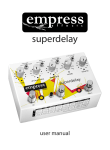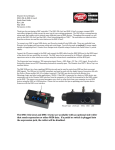Download Empress Tremolo2 User Manual
Transcript
tremolo2 user manual Introduction Back in 2005 we released our first pedal, the Tremolo. It was one of the first tap tempo tremolo on the market and, to this day, remains as sought after as when it was first released. We have built on everything we have learned over the past eight years, and are proud to release the next generation of tremolo, the Empress Tremolo2. The Empress Tremolo2 has the same analog signal path as its predecessor, but we've added a bunch of features that make it more versatile. Now you can use up to 8 presets, and you can plug in a slew of things to control it, including expression pedal, external switches, and MIDI. Please rock responsibly, Steve Bragg Quickstart Plug your guitar into the lower jack on the right side. Plug your amplifier into the jack on the left side. Plug a 9-12VDC power supply into the power jack on the left side (2.1mm barrel connector, negative tip). Set the mode switch to "knob," the waveform switch to "tube," the depth to half, rate to half, rhythm to 1, and output to half. That's your standard tremolo. Tap Tempo Mode In tap tempo mode, use the "tap|preset" stompswitch to enter a speed for the tremolo. The tremolo will change to the new speed after 2 taps and will average the speed of the last 4 tap times. Use the ratio knob to change the ratio of tapped tempo to tremolo tempo. Available ratios are 1:1, 3:4, 1:2, 1:3, and 1:4. Knob Mode In knob mode, use the rate knob to set the speed of the tremolo. Hold down the "tap|preset" stompswitch as a brake that will slow down the tremolo speed while the stompswitch is held. Preset Mode Preset mode allows you to save and recall presets. All settings of the pedal are saved in a preset including tempo, front panel controls and expression pedal assignment. Each preset is represented by a different color in the "tap|preset" LED. To load a preset, use the "tap|preset" stompswitch to scroll through presets sequentially. The LEDs will blink indicating the preset is ready to load. Press the bypass switch while the LEDs are blinking to engage the new preset. To save a preset, set the Tremolo2 to the settings you want to save. Use the "tap|preset" switch to scroll to the color where you would like to save the preset. Then, while the LEDs are blinking, hold down the save button and press the "tap|preset" stompswitch. Changing the number of available presets: The Empress Tremolo2 ships with 4 available presets, but you can use between 1 and 8 presets. Please see the "Advanced Configuration" section on how to change the number of available presets. While in Preset mode, use the rate knob or an external tap switch to adjust the speed of the tremolo. To modify tremolo parameters away from their saved value, simply move the knob or toggle. Control Port The control port jack allows the Empress Tremolo2 to be controlled by a multitude of devices. The pedal ships configured to accept an expression pedal. Please see the "Advanced Configuration" section on how to configure the control port for the device you want to use. Control Voltage (CV) With CV control, the Empress Tremolo2 responds to CV signals from 0 to 5 volts. Otherwise, the CV configuration works exactly like the expression pedal configuration. External Tap Switch The Empress Tremolo2 can be used with an external switch. In tap tempo mode, both the pedal's "tap|preset" stompswitch and the external switch control the tap tempo. In knob mode, the external switch isn't utilized. In preset mode, the pedal's "tap|preset" stompswitch toggles through presets, the external switch controls tap tempo, and the "rate | ratio" knob controls the ratio. Expression Pedal Each parameter, with the exception of the mode switch, can be controlled simultaneously via the expression pedal. To control a parameter with the expression pedal, move the parameter's knob to the desired heel setting, then hold down the save button and move the knob to the desired toe setting, then release the save button. Multiple parameters can assigned for expression pedal control simultaneously by repeating this process for each parameter to be assigned. Each parameter can be set with independent heel and toe settings. To release a parameter from the expression pedal's control, simply move the knob or switch that controls that parameter. To clear all of the parameters from expression pedal control, press the save switch 3 times. Any expression pedal used with the Empress Tremolo2 should have the following connections: tip to signal, ring to power, and sleeve to ground. Controls a Mode: Sets the operation mode of the pedal. Tap Tempo: The rate of the tremolo is set by tapping on the tap stompswitch. Knob: The rate of the tremolo is controlled by the rate knob. Preset: Save and recall settings stored in up to 8 presets. Power: + - 9V - 12V Save: Use to save presets and a Depth: The amount of tremolo effect applied to signal. Rate | Ratio: In knob mode, this sets the speed of the tremolo effect. In tap tempo mode, this sets the ratio of foot taps to tremolo pulses. For example, at a 1:2 ratio, the tremolo will do eighth notes when you tap quarter notes. Output Tap | Preset: Perfoms a different function in each mode. Tap Tempo: Tap to set the tempo of the tremolo effect. Tapped tempo is multiplied by the ratio to set the rate of the tremolo effect. Knob: Press for a brake that slows the tempo of the tremolo while switch is held down. Bypass: Press to engage / byp illuminated, the tremolo is enga Preset: Press to scroll through presets. Presets: When scrolling throug Press the bypass switch to enga at a Glance V DC. 100mA or greater assign expression pedal control. pass the pedal. When the LED is aged. gh presets, this LED will flash. age the new preset. Waveform: Sets the shape of the tremolo envelope. Triangle: Your standard tremolo waveform. Smooth ramp from loud to soft. Tube: An asymetrical waveform modeled after classic tube amp tremolo. Square: Tremolo turns on and off with no volume ramp. Great for choppy sounding effects. Output: Sets the overall output level (volume) of the pedal. Control Port: Control the tremolo via expression pedal, external tap, control voltage and MIDI. Input Rhythm: Here are the eight rhythms with "0" being accented: 1) 0000 (normal tremolo) 2) 0x0x 3) 0xx0xx 4) 0xxx0xxx 5) 0xx0xx0x 6) 0x0x00x0x0 (this one is in 5/4) 7) 0xx0xx0x0x0x 8) 0xx0xx0xxx0x0xxx Advanced Co The advanced configuration mode lets you customize Bypass Mode: Select to use true bypass or buffered bypass. True Bypass (default): Set the mode toggle switch to the left (tap tempo). Buffered Bypass: Set the mode toggle switch to the right (preset). Preset Mode: Select how to change presets. Two Button Switching (default): Set the rate|ratio knob all the way counter-clockwise. One Button (instant) Switching: Set the rate|ratio knob all the way clockwise. Ramp Speed: Select how long it takes to ramp from one preset to another. Setting the depth knob fully counter-clockwise (default) will have no ramping; the rate changes immediately to the new preset's rate. Setting the depth knob fully clockwise will have a long ramp between presets, much like a Leslie cabinet changing from slow to fast. The knob can be set anywhere in between to fine tune the ramp time. Entering Advanced Configur from the Empress Tremolo2. while holding down both stompswitches. The bypass L confirm that you are in the mode. Modify Settings: Use the co configure the pedal as you l modified, the tap LED will change has been made. Exiting Advanced Configura and bypass stompswitches bypass LED will blink twice to has exited the advanced con reboot into the standard ope Factory Reset: While in the advanced configuration, press the following s dance to confirm that the tremolo has been reset to its factory settings. Pl onfiguration e the functionality of the tremolo to suit your needs. ration: Unplug the power . Plug the power back in h the tap and bypass LED should blink twice to e advanced configuration ontrols outlined below to like. When a parameter is blink to confirm that a ation: Press both the tap s at the same time. The o confirm that the tremolo nfiguration mode and will eration mode. Use the waveform switch to select which function to modify then use the rhythm selector to set the value. Number of Presets (default 4): Set the waveform switch to the left (triangle) then use the rhythm knob to select from 1-8 presets. MIDI Channel (default 1): Set the waveform switch to the right (square) then use the rhythm knob to select from MIDI channel 1-8. Control Port Configuration: Set the waveform switch to the middle (tube) then use the rhythm knob to select how you would like to use the control port from the chart below: 1 - expression pedal (default) 2 - control voltage 3 - external tap switch (latching) 4 - external tap switch (momentary - normally open) 5 - external tap switch (momentary - normally closed) 6 - MIDI Presets Write Protect: Select if presets can be overwritten and changed on the fly or locked to prevent accidental changes. Unlocked (default): Turn the output knob all the way counter-clockwise. Locked: Turn the output knob all the way clockwise. stompswitches in order: tap, bypass, tap, bypass. The LEDs will do a little lease note that this overwrites the current presets with the factory presets. MIDI Configuration The Empress Tremolo2 allows all of its parameters to be controlled via control change messages, it's presets to be selected with program change messages, and its tempo controlled with MIDI clock messages. To use MIDI with your Empress Tremolo2, you'll have to do the following: 1. Attach the Empress Midibox using a ¼” patch cable to the control port. The Midibox is not included with the Empress Tremolo2. 2. Configure the pedal for MIDI control and set the MIDI channel. See the "Advanced Configuration" section for instructions on doing this. Choose a MIDI channel that won't conflict with other devices in your MIDI rig. Recalling a preset via MIDI (Program Change Messages) You can activate a preset by sending a MIDI Program Change message. For example, sending a Program Change message of 7 activates preset 7. MIDI Clock (aka MIDI Beat Clock) The Empress Tremolo2 will respond to MIDI Clock messages. MIDI Clock specifies quarter notes, subdivided into 24 MIDI Messages. Each quarter note corresponds to 1 period of the tremolo’s waveform. Warning: The Tremolo2 listens for MIDI Clock messages by default. If it receives a MIDI Clock message, it will rely on the messages for its tempo. This means that the Tremolo2's volume will freeze if the MIDI Clock messages are discontinued. To unfreeze the Tremolo2, send a MIDI Clock Listener message (CC #51) with a value of 0. Control Change Messages The Empress Tremolo2 can be controlled with MIDI control change messages. Below is a table that shows which MIDI control change channel controls each Tremolo2 parameter. Tremolo2 Parameter Depth CC #: 20 Rate | Ratio 21 Output 23 Rhythm 22 Mode 24 Waveform 25 Rhythm Downbeat 26 Note: Sending a value 0 would be equivalent to the knob completely counter clock-wise, sending 127 is equivalent to fully clock-wise. Sending a value of 1 will set the rhythm to 1, sending 2 will set rhythm to 2, etc. Sending 1 will set it to tap tempo mode, 2 knob mode, and 3 preset mode. Sending 1 will set it to triangle, 2 tube, 3 square. Value sent determines which beat of the rhythm will fall on the downbeat. A value of 3 will have the 3rd beat of the rhythm on the downbeat. Waveform Phase 27 Tap Switch 35 Bypass Switch 36 Direct Control 40 Exit Direct Control 50 MIDI Clock Listener 51 A Value of 64 has the waveform in phase. Higher values move the waveform ahead relative to the beat and smaller values move it behind. Sending a value of 127 simulates the switch being pressed. Sending a value of zero simulates releasing the switch. Sending a value of 127 engages the pedal, sending a value of 0 bypasses the pedal. Sending this message overrides all other settings and lets you set the amount of tremolo volume directly with MIDI values This mode would allow you to draw your own waveforms in a DAW and send them to the Empress Tremolo2. Sending this message with any value will cause the pedal to exit direct control. Sending a value of 0 causes the pedal to ignore MIDI Clock messages. Sending a value of 127 causes the pedal to listen for MIDI Clock messages. (by default, the pedal listens for MIDI Clock messages) Specifications Input Impedance: Output Impedance: Frequency Response (-3dB): Output Headroom: Distortion: Signal to Noise Ratio: Input Voltage: Required Current: Power Input Connector: Height (enclosure only): Height (including controls): Length: Width: Weight: 1M Ω 330 Ω 4Hz – 30kHz +9.2 dBu 0.081% -107.7dB 9VDC – 12VDC 100mA 2.1mm Barrel Connector 1.5” 2” 3.5” 4.5” 1lbs www.empresseffects.com
















